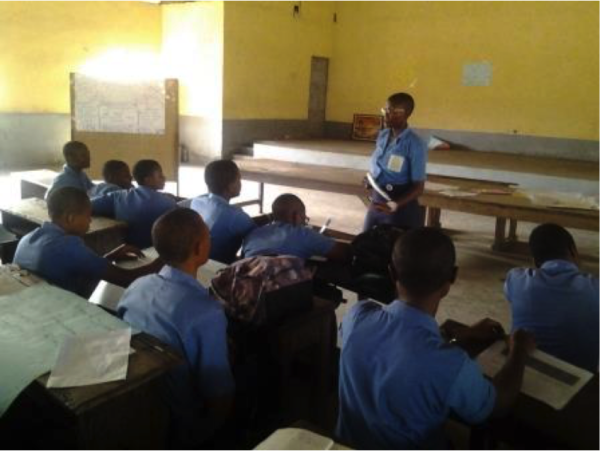
Recently, Shilpa Banerji submitted an entry to the World Bank’s Governance for Development Blog on “How students in Cameroon are fighting corruption in schools”. It describes how, with the help of about US$15,000 grant from the Governance Partnership Facility, the ZENU Network helped train high school students on how to counter corruption at their schools. This reminded me that for some years now the Partnership for Transparency Fund (PTF) has also been involved in such training in Cameroon, and that the NGOs involved are still “going strong”.
It is useful to take note of the good practice experiences and while various NGOs could be mentioned, I will limit myself to the one I personally was associated with, the Action Group for Democracy and Good Governance (AGDGG).
AGDGG is a relatively small NGO, which, in partnership with the International Peace Commission (IPC), submitted a proposal to PTF in 2011 to help fund an Education Resource Management Project, aimed at improving the capacity of the school management committee (SMC) and students to curb corruption and increase transparency at the Government Bilingual High School in Limbe. Although schooling is supposed to be free of charge, in practice parents pay substantially, and both government and parents’ contributions for school operations (teacher salary supplements, chairs, classroom improvements, etc) were poorly managed by the SMC, resulting in considerable “leakage”. The experienced and committed school principal, keen to remedy the situation, reached out to AGDGG.
They agreed upon a comprehensive project, including training in budget tracking, designing and signing a code of conduct by the stakeholders, and arranging field assignments where SMC members were taught to check and monitor school budgets and expenditures. AGDGG then submitted this to PTF for financial and technical support. Its total cost was about US$24,000, funded by a PTF grant of US$21,300 and with AGDGG contributing the rest. The project was implemented in six months, faster than foreseen. This was helped by its relatively small size, collaboration and provision of training materials by the more experienced IPC, active support of the school principal, endorsement by all stakeholders, including education authorities, and substantial and clever media exposure.
As a result, all stakeholders are now involved in the school resource budget and monitoring process, and they have signed off on a newly designed and agreed code of conduct. The latter was also welcomed by the regional education authorities, and is expected to become a model to be applied elsewhere in the region’s secondary school system.
PTF’s project completion assessment concluded that 1. Citizen organizations can provide input and assist with strategies to promote accountability, 2. School managers mostly lack functional competencies to combat corruption and should be trained, 3. Student stakeholder groups were ignored, but should be involved and 4. Multi-stakeholder approach is required to fight corruption in a non-confrontational way.
After the project’s completion, the school principal was promoted to another, larger school, the Government High School in Buea, where she initiated the same reforms, while her earlier deputy was promoted to principal at the Lycee in Limbe, where she implemented similar kinds of reforms. Meanwhile, AGDGG was planning to scale up its activities with further PTF support. Unfortunately, this was stymied by PTF’s own funding constraints.
However, based on the earlier finding that students should have played a more substantial role in dealing with the education system’s substantial resource misallocation issues, AGDGG approached Indigo Trust of the UK for support of a project called “Building the capacity of students. How to use ICT tools during non-violent conflict and fighting against corruption practices on campus” at the University of Buea and two high schools, the Government High School in Buea and the Government High School in Limbe.
With a UK₤ 6,900 Indigo Trust grant, the project has just been completed. It consisted of training of university and high school students and staff in how to recognize corruption and violence on their campuses, how to organize non-violently, and how to use social media to report (SMS, voice and email) on issues.
The most recent activities included a major workshop at the University of Buea, chaired by the University’s Vice Chancellor. She reportedly stated that she considers the students’ ability to use ICT as a tool to report on fraud and to suppress violence on campus essential and valuable to maintain academic discipline, as well as to build the students’ civic responsibility. It should also be noted that the University is preparing a diploma course on anti-corruption, called “Advanced Certificate in Public Service Governance and Corporate Corruption Management”.
AGDGG is still involved with students, guiding them on how to respond to new corruption reports and threats of violence. This has already resulted in the criminalization by school administrations of illegal fees collected from students by “school gate keepers”, student prefects and teachers. Indeed, one of the school prefects was just dismissed for this reason. Similarly, a student was removed from school for violence. In turn, these corrective actions contributed to increased student interest in the non-violent and ICT training activities.
Both the activity described by Ms Banerji and the one described by me confirm that, if we are to fight corruption in the education sector, we have to bring in all stakeholders, and most importantly the students. After all, it is the students who have most to gain from getting access to efficient and cost-effective education. And by converting the younger generation into “anti-corruption believers and activists”, we have a chance to establish a sustainable and growing anti-corruption effort. It is only recommended that the organizations described by Ms Banerji and me join forces. The NGOs in Cameroon are quite active and competent, but increased cooperation would help them to scale up their activities and, thus, results.

